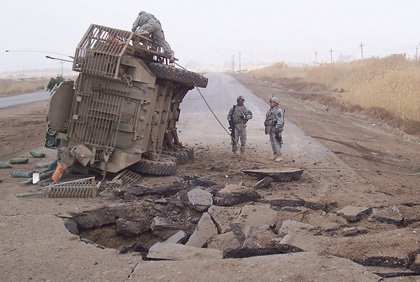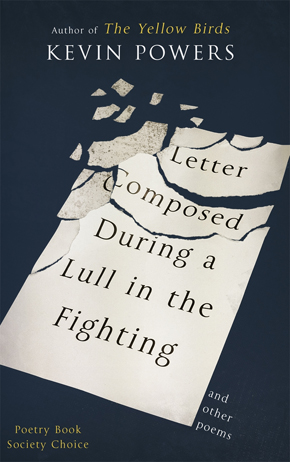Improvised explosive device
by Kevin PowersThe blast from an improvised explosive device moves at 13,000 mph, gets as hot as 7,000 degrees and creates 400 tons of pressure per square inch. “No one survives that. We’re trying to save the kids at 25 meters and beyond.”
– Ronald Glasser in the Army Times
If this poem had wires
coming out of it,
you would not read it.
If the words in this poem were made
of metal, if you could see
the mechanics of their curvature,
you would hope they would stay covered
by whatever paper rested
in the trash pile they were hidden in.
But words or wires would lead you still
to fields of grass between white buildings.
If this poem were made of metal and you read it, if you did
decide to read or hear the words, you would see wires
where there were none,
you would pick up the slack of words, you would reel
them in, pull
loose lines until you stood in that dry field,
where you’d sweat. You would wonder how you looked
from rooftop level, if you had been targeted.
If these words were buried beneath debris, you would
ask specific questions, like, am I in a field of words?
What will happen if they are unearthed?
Is the entire goddamn country full of them?
Prefer that they be words, not wires, not made of metal,
which is almost always trouble. If these words should lead you
to the rough center of a field,
you’ll stand half-blind
from the bright light off white buildings,
still holding the slack line in your hand,
wondering if you have been chosen.
You’ll realize that you both have been and not,
and that an accident is as much of a choice
as saying, “I am going to read this poem.”
If this poem had wires coming out of it,
you would call the words devices,
if you found them threatening in any way,
for ease of communication
and because you would marvel
at this new, broad category.
This is another way of saying
we’d rely on jargon to understand each other,
like calling a year a tour,
even though there are never any women
in bustled dresses carrying umbrellas
to protect complexions. In moments
you might think these words were grand,
in an odd way, never imagining you would
find a need to come back to them,
or that you’d find days
that you were desperate
for the potential of metal,
wires, and hidden things.

A Stryker AFV armoured personnel carrier hit by a deeply buried IED south of Sheikh Hamed, Iraq in 2007. Wikimedia Commons
And if this poem was somehow traveling
with you
in the turret of a Humvee,
you would not see the words
buried at the edges of the road.
You would not see the wires. You would not
see the metal. You would not see the danger
in the architecture
of a highway overpass.
If this poem has left you deaf,
if the words in it are smoking,
if parts of it have passed through your body
or the bodies of those you love, this will go a long way
toward explaining why you will, in later years,
prefer to sleep on couches. If these words have caused
casualties, then this poem will understand
that, oftentimes, to be in bed
is to be one too many layers
away from wakefulness.
If this poem was made of words
the sergeant said – after, like, don’t
worry boys, it’s war, it happens –
as the cab filled up with opaque smoke
and laughter, then it would be natural
for you to think of rote – rauta,
the old Norse called it, the old
drumbeat of break of wave
on shore – as an analogue
for the silence that has filled your ears
again
and particles of light
funneled through the holes made by metal
meeting metal meeting muscle meeting bone.
You would not see. You would not hear. You would not
be blamed for losing focus for a second: this poem
does not come with an instruction manual. These words
do not tell you how to handle them.
You would not be blamed
for what they’d do if they were metal,
or for after taking aim at a man holding a telephone in his hand
in an alley. You would not be blamed for thinking
words could have commanded it.
If this poem had fragments
of metal coming out of it, if these words were your best friend’s legs,
dangling, you might not care or even wonder whether
or not it was only the man’s mother on the other end
of the telephone line. For one thing, it would be
exonerating. Secondly, emasculating (in the metaphorical
sense of male powerlessness, notwithstanding the likelihood
that the mess the metal made of your friend’s legs and trousers
has left more than that detached). If this poem had wires for words,
you would want someone to pay.
If this poem had wires coming out of it,
you wouldn’t read it.
If these words were made of metal
they could kill us all. But these
are only words. Go on,
they are safe to fold and put into your pocket.
Even better, they are safe
to be forgotten.
From Letter Composed During a Lull in the Fighting, published by Sceptre.
 Kevin Powers was born and raised in Richmond, VA. In 2004 and 2005 he served as a machine gunner with the US Army in Mosul and Tal Afar, Iraq. He studied English at Virginia Commonwealth University after his honourable discharge and received an MFA in Poetry from the Michener Center for Writers at the University of Texas at Austin in 2012. His debut novel The Yellow Birds won the Guardian First Book Award 2012 and was a New York Times bestseller in its first week of publication.
Kevin Powers was born and raised in Richmond, VA. In 2004 and 2005 he served as a machine gunner with the US Army in Mosul and Tal Afar, Iraq. He studied English at Virginia Commonwealth University after his honourable discharge and received an MFA in Poetry from the Michener Center for Writers at the University of Texas at Austin in 2012. His debut novel The Yellow Birds won the Guardian First Book Award 2012 and was a New York Times bestseller in its first week of publication.
kevincpowers.com


